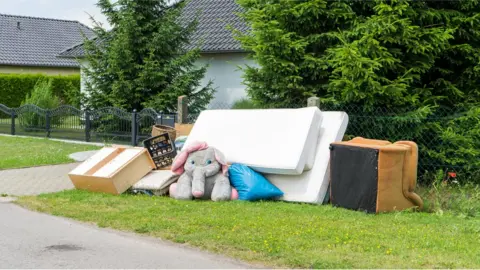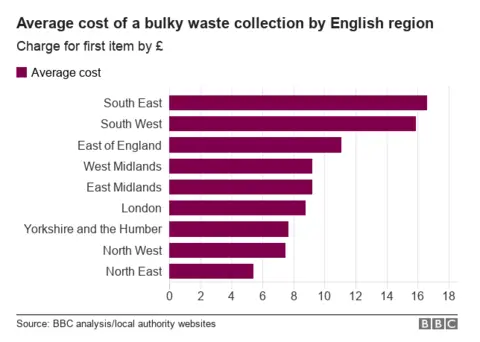Northern Ireland cheapest for bulky waste collections
 Getty Images
Getty ImagesNorthern Ireland is the UK's most generous nation for bulky waste collections, data collated by the BBC shows.
More than half of the councils in Northern Ireland remove bulky waste for free.
Northern Ireland is also the cheapest nation for bulky waste collections, with an average cost of just £2.
Some councils across the rest of the UK charge more than £100 for collections of multiple items.
The figures come from research conducted by the BBC's Shared Data Unit, which looked at bulky waste collection costs imposed by councils across the UK.
Less than £1
In 2017-18, there were nearly one million fly-tipping incidents in England.
Of those, more than half (521,895) of the items dumped were white goods or other household waste - a category that includes furniture.
In Northern Ireland, the most expensive bulky waste collections are provided by Ards and North Down Borough Council, but its average charge at first collection is just £2.50.
The cheapest collections are provided by Mid Ulster Council and Causeway Coast and Glens Borough Council.
The difference between the cheapest and most expensive bulky waste collections in Northern Ireland is less than £1.


What is bulky waste?
Rubbish collection is one of the most basic services provided by local councils, but not all household waste is covered by the cost of council tax.
Bulky waste includes furniture, household electrical items such as televisions and white goods, including fridges and freezers.
The collection of domestic waste is governed by the Environmental Protection Act 1990 and the Controlled Waste regulations 1992.

The regulations say councils can charge for the collection of certain materials, including waste that does not fit into a household bin or waste which exceeds 25kg in weight.
Most councils provide some form of bulky service, whether directly, through a partnership with a waste contractor, or charities and social enterprises that specialise in recycling.
How do councils charge for bulky waste?
With councils facing increasing pressure on their budgets, the majority of local authorities across the UK have introduced additional charges for bulky waste collections, a service many once provided for free.
The BBC Shared Data Unit's analysis on council bulky waste statistics revealed widespread variation in how much people were being asked to pay, with prices ranging from just a few pounds for a single item to more than £100 for the collection of multiple items.
There is little consistency in the often confusing pricing structures set by councils:
- Most local authorities charge per item, but there are other ways of charging
- Some assign "items points" to determine a price. Other councils charge a set price no matter how many items are collected, while others have a minimum fee, and then additional charges
- Some councils impose a separate charge for the collection of white goods such as fridges and freezers
- There is also widespread variation in discounts available for pensioners and people on benefits, while some councils do not offer any help at all
- Some councils will only pick up a certain number of items before charging, while others warn residents may have to wait several days, or even weeks, before their bulky waste is taken away
A new government waste strategy was launched in December which includes consulting on plans for manufacturers to foot the cost of disposing of the goods they produce.
More about this story
The Shared Data Unit makes data journalism available to news organisations across the media industry, as part of a partnership between the BBC and the News Media Association.
For more information on methodology, click here. For the full dataset, click here. Read more about the Local News Partnerships here.
